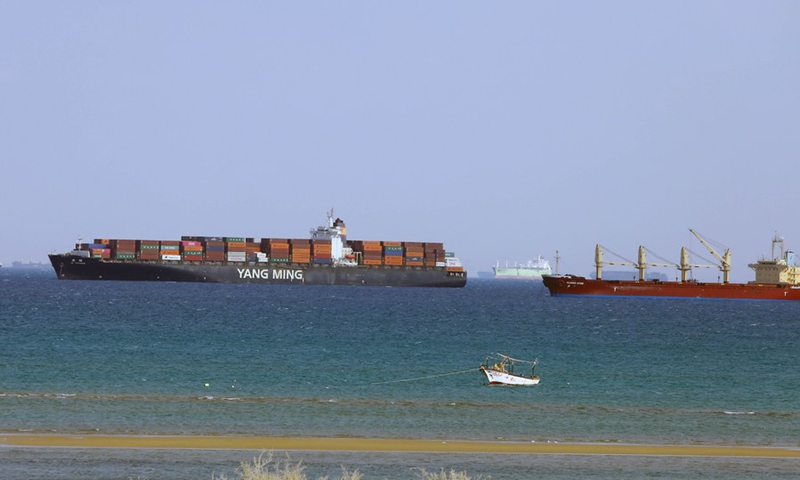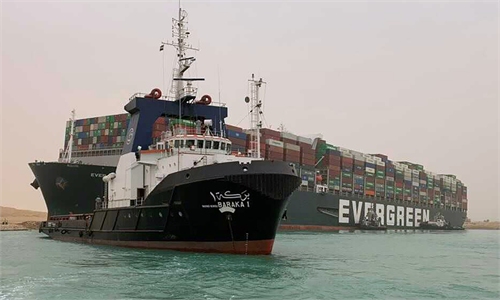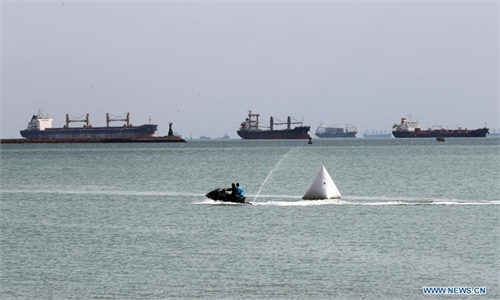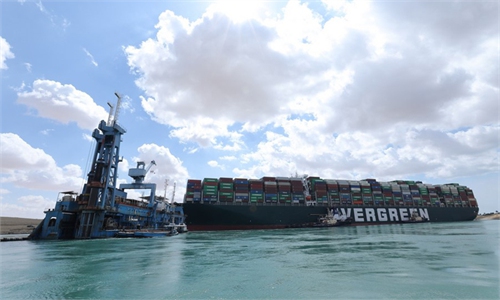China-Europe cargo trains shine, as Suez Canal blockade drives shippers to seek new options
Suez Canal blockade drives shippers to seek new options

Ships wait to pass the Suez Canal in the Gulf of Suez, Egypt, on March 26, 2021.(Photo: Xinhua)
Despite the logjam in the Suez Canal caused by a massive containership that got stuck in the key waterway, traders in China have seen a limited impact on their operations, with many turning to more reliable alternatives such as China-Europe freight train service to take much-needed goods from factories in China to the European market.Since the Suez jam developed, China-Europe long-distance train service has seen a surge in demand, with shipping rates rising by 10-20 percent in some cases. That's especially true for high value-added goods that have tight delivery schedules, ranging from electronic devices to virus prevention items, industry insiders said on Monday.
"The mammoth cargo ship blocking one of the world's most vital maritime arteries was wrenched from the shoreline and set partially afloat again early Monday, raising hopes that traffic could soon resume in the Suez Canal," The New York Times reported.
However, after about a week of the jam, traders have started looking for other shipping options.
Several industry insiders in the China-European trade business told the Global Times on Monday that they have seen a rise in demand for China-Europe freight trains after the incident, as the clients are seeking stable and safe options to secure their deals.
YQNLINK, a domestic global logistics online services platform, has seen client queries about China-Europe cargo trains jump two to three times since the canal was blocked.
"Some of our goods are stranded on the Evergreen Marine and other ships queuing in the canal, and we are offering more alternatives for our clients with urgent needs. One is to use cross-border cargo trains," Zhou Shihao, founder and CEO of YQNLINK, told the Global Times on Monday.
The elevating demand for freight trains has pushed up rates by 10 percent on some routes, industry insiders said, which is said to be within expectations.
"What normally takes 30-40 days by ship from China to Europe, only takes 15-25 days by train," said Zhou, noting that after the blockage of the Suez Canal, ships need to detour around the Cape of Good Hope in South Africa, which will take another 10 days.
Meanwhile, freight rates for trains and ships are similar overall, even with the booming demand for land transport, experts said.
Despite the rising demand, for trains to replace maritime transport's major role in trade is not feasible. A large cargo ship can carry more than 20,000 standard containers (20-foot equivalent units). It would take 50 trips by a cargo train to carry that much merchandise.
In addition, underdeveloped facilities and limited manpower at some overseas terminals affects the capacity of trains.
But trains are still a viable option, especially for those in value-added businesses like electronic devices and virus prevention items, said Zhao Juan, research fellow with the China Railway Economic and Planning Research Institute.
The significance of the China-Europe cargo trains is as a supplement to secure the stability of supply chains, said Tommy Tan, president of Shanghai EPU Supply Chain Management Co.
"At first we thought the canal jam would lead to explosive demand and push up rail freight rates, but that didn't happen," said Tan.
In order to ensure smooth trade flows, Urumqi's customs office is doing customs clearance in less than two hours, a source with the customs office told the Global Times on Monday.
A source with Yiwu's customs office surnamed Zhao said there hasn't yet been much change on cargo trains since the Suez Canal congestion developed. It usually takes some time for companies to switch logistics channels.
"But we are fully ready for more goods," said Zhao, noting that the office inspects goods upon arrival, a working standard that has been the case for two years.
Despite the pandemic in 2020, China-Europe cargo trains made more than 10,000 runs - a first since the service was launched, data from the China State Railway Group Co (China Railway) shows.
Industry analysts said that it is important to diversify trade routes for secure supply chains, and the development of cross-border freight trains service is a good example.
Arctic shipping routes could also be a shortcut in the future that would offer more options and shorten delivery time, experts said.



